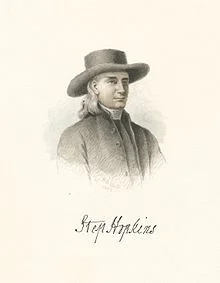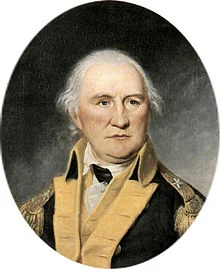Stephen Hopkins' Hand Trembles
Stephen Hopkins knew the importance of the moment when he signed the Declaration of Independence. As such, he uttered one of those killer lines you only seem to hear in movies nowadays. It's one of those lines that makes you heart skip a beat and a lump pull up in your throat.
I decided to tell that part of the story upfront, then go back and discuss what lead this man to this moment. It's a bit off kilter from my usual chronological articles but, well, I thought the story might have more impact this way.
Stephen Hopkins
Stephen Hopkins was the second oldest man in the room.
He and his colleagues had just voted in favor of separating with Great Britain. It was time to sign the document.
Hopkins, who was stricken with palsy, used his left hand to steady his right. After scratching a messy autograph onto the Declaration of Independence, he looked across the table to Charles Thomson and William Ellery and gave one of the most confident, enduring remarks in American history.
“My hand trembles, but my heart does not.”
The Rights of the Colonies Examined
Stephen Hopkins, for all intents and purposes, should not have been a revolutionary.
He came from a wealthy family, further making money with successful merchant and iron works businesses. Additionally, Hopkins had spent the better part of 45 years bouncing back and forth between the positions of Governor and Chief Justice of Rhode Island.
Stephen, however, had long held the belief that uniting the colonies would be beneficial. Twenty years earlier, he had attended the Albany Conference. This Conference, at the onset of the French and Indian War, had been called by Benjamin Franklin to treaty with the Iroquois as well as discuss the mutual defense of the colonies.
Later, when the British raised taxes in an effort to pay for the war, Hopkins wrote The Rights of the Colonies Examined. This pamphlet, being written by the Governor, was published by the Rhode Island Assembly. It was sent throughout the colonies and looked to as one of the earliest, most coherent defenses of the opinions of the Americans.
Common Cause
Hopkins’ number one rival was Samuel Ward. In fact, the two spent about twenty years alternating terms as Governor of Rhode Island.
Eventually, as the American Revolution grew near, the two men put their differences aside. They agreed there was a more important issue at hand.
When Rhode Island selected delegates for the First Continental Congress, Hopkins and Ward were the two men chosen. The leaders of the colony’s two rival parties were united as representatives, demonstrating just how widespread support of the war was there.
Articles of Association
Hopkins arrived in Philadelphia confident that war was the only way to settle the disagreement with Great Britain and committed to the idea of independence.
At this early stage, most delegates at the Continental Congress did not share his enthusiasm for separation. He did, however, sign the Articles of Association which called for a boycott of all British goods.
Independence
By the time he arrived for the Second Continental Congress, war had begun.
Hopkins, familiar with the seas due to his mercantile experience, was placed on the committee which established the Continental Navy. He used his position to have his brother, Esek Hopkins, named as the first Commander of the Navy.
Soon, however, Stephen traveled back to Rhode Island, where he led the colony in declaring independence from Great Britain a full two months before the Continental Congress.
Hopkins then returned to Philadelphia one last time, where he signed the Declaration of Independence.
Stephen Hopkins, now quite old and limited by his affliction, returned home to witness the Americans win the war and begin a new nation.
If you enjoyed this article, you might like a shirt I’ve made with this quote on it!
“My hand trembles, but my heart does not,” is an inspirational quote from Founder Stephen Hopkins as he signed the Declaration of Independence with hands that were riddled with palsy.
• Additional Shipping and Handling
• Currently not accepting returns
If you made it this far, you might have enjoyed the article. So tell me...who should I do next? Leave me comments to let me know what Founder you'd like to hear about and I'll do my darnedest to make that happen. And if you haven't yet, remember to subscribe to the email list.
If you like brief biographies of signers of the Declaration of Independence (like this one), you'll love 'Signing Their Lives Away' by Denise Kiernan and Joseph D'Agnese This book has long been one of my favorite 'table read' type books where you can just pick a name and read about that person quickly. It helped me personally look at the Founders as individuals with interesting lives outside of the Convention Halls instead of just The Founding Generation. Pick up the book from the link below through our affiliate Amazon and support this site with no increase in your costs. Thanks!







